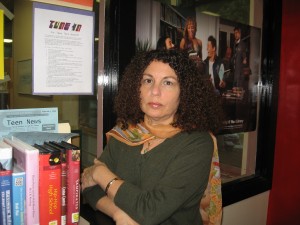Kathleen de la Peña McCook
Distinguished University Professor, University of South Florida School of Library and Information Science
Don’t back down in fighting for what is right even if this makes you unpopular. Join the ACLU. Be active in local government. Be aware of the impact of electoral politics on the lives of people. Fight for human rights and social justice.
How do you describe what you do as a librarian to your family or to people at a party?
This has changed for me over time. Since I began teaching full-time in 1978 it has been a long time sine I practiced librarianship. But I have developed courses that I hope have influence on the field. I tell people about the classic book, Pedagogy of the Oppressed byPaulo Freire and a guide to adult services for literacy and lifelong learning.
At present I am teaching expansive courses on librarianship and human rights and in this 60th anniversary year I tell people that librarians can work as Eleanor Roosevelt stated:
Where after all do universal human rights begin? In small places, closes to home – so close and so small that they cannot be seen on any map of the world. Yet they are the world of the individual person: The neighborhood he lives in; the school or college he attends; the factory, farm or office where he works. Such are the places where every man, woman, and child seeks equal justice, equal opportunity, equal dignity without discrimination. Unless these rights have meaning there, they have little meaning anywhere. Without concerted citizen action to uphold them close to home, we shall look in vain for progress in the larger world.
-Remarks at the United Nations, March 27, 1953
How did you first got involved?
When I was in college at the University of Illinois-Chicago, after Martin Luther King Jr. was assassinated I began to volunteer on Chicago’s west side with youth who needing tutoring in the aftermath. I substitute taught in the Chicano neighborhoods of Chicago prior to earning my library degree at the University of Chicago. While I worked as a librarian at Dominican University I worked on the Paul Robeson collection in a storefront art workshop. When I began study for the PhD I worked with Helen Lyman (literacy expert) and Margaret E. Monroe (adult services scholar) nd work with them helped shape my commitment to adult services.
What special projects, initiatives or committees have you been or are involved in?
For ALA, I served as chair of the ALA COSWL and later the OLPR Advisory Committee and OLOS Advisory Committee.
I served on the ERA Task Force.
I worked with Katharine J. Phenix on On Account of Sex
I edited RQ which was the journal that preceded RUSA Quarterly.
I wrote an essay on ALA’s commitment to equity of information which is on the ALA website: Rocks in the Whirlpool
For the Progressive Librarians Guild, I have served on the editorial board of The Progressive Librarian and coordinating committee. I have been able to report on library unions.
What experiences in ALA have been the most rewarding?
Editing the May 2000 issue of American Libraries on libraries serving poor people.
Working with President Barbara J. Ford during her presidency and editing the book Libraries: Global Reach, Local Touch
Speaking at the ALA President’s program in 2000
and booksigning for A Place at the Table, a book I did for ALA editions.
Working with Margaret Myers (OLPR), Peggy Barber (PIO), Andy Hanson (RUSA/RASD), and Peggy Sullivan all now retired, from ALA…as well as Satia Orange in OLOS, Jennifer Grady for unions in ALA-APA, Mary Ghikas on ALA history
Serving on the RUSA Notable Books Council.
Serving on the Better Salaries Task Force.
What advice would you give to up and coming librarians?
Join the ACLU. Be active in local government. Be aware of the impact of electoral politics on the lives of people. Fight for human rights and social justice.
What do you think are the top three issues facing librarianship (positive or negative) that could change the course of things?
Serving the cause of Human Rights
Fighting for Freedom of Information and the First Amendment
Freedom in the Workplace
If we should try to change that course, how should we go about it?
Connect and interact with Human Rights organizations and causes
Continue the fine work of the OIF
Place unions higher in the priorities and work of ALA by better supporting ALA-APA
Tell us from your own experience one lesson you have learned.
“Don’t back Down” in fighting for what is right even if this makes you unpopular. For example, see this entry from one of my blogs.
What values (personal traits or characteristics) do you look for and admire in a leader?
Integrity, openness, follow-through.
How do you recognize contributions of others in your library and in your community?
Well, in my case I have tried to support graduates and colleagues for their contributions through ALA or FLA recognitions. I recently worked on the (successful!) nomination fo Dr. Peggy Sullivan for ALA Honorary member. I try to identify people whose work deserves to be shown to a broader audience.
Who do you think is a library leader?
People who uphold the values of librarianship…I have to name the CONNECTICUT FOUR…for their challenge to the National Security Letter and gag order provision of the USA PATRIOT Act.George Christian, Peter Chase, Barbara Bailey and Jan Nocek
What or who influenced you to become a librarian?
My father, who never graduated from high school, loved and used the library for life long learning.
If you could do anything in your career differently, what would that be and why?
I would not have spent so much time as an administrator. I would have spent more time on social justices, human rights and first amendment issues. I am working on these almost exclusively now.
